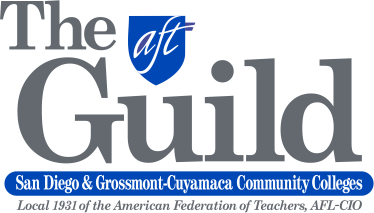The Signing of AB 438 was a Victory for Classified Employees
This bill provides equity in lay-off notice for classified employees. Importantly it provides permanent classified school employees and those who become permanent classified school employees with the same rights to notice and hearing with respect to layoffs as are provided to certificated employees of school districts, including teachers and administrators, and academic employees of community college districts. If classified positions must be eliminated as a result of the expiration of a specially funded program, the bill would require written notice of the layoff date and certain rights be given to the classified employees not less than 60 days before the effective layoff date.
The Veto of AB 375 was a Setback for Part-Time Faculty, But Some Hope Remains in Budgetary Process
This bill would have changed the workload to 85% for community college part-time faculty
and required that negotiation on reemployment preference for part-time, temporary faculty assignments be based on the minimum standards not exceeding 80% to 85% of a full-time equivalent load (up from 60% to 67%) and would have prohibited the community college district from restricting the terms of the negotiated agreement to less than that range, unless explicitly agreed upon by an individual part-time, temporary faculty member and the district.
The Governor’s veto message cites cost factors as a contributing factor and points to the budget as the best place to deal with those issues. The State Chancellor’s Office stated the bill would cost $440 Million each year in new health care costs to implement due to triggering ACA requirements. They made this claim despite the fact that the new proposed cap of 85% avoids any automatic ACA triggers. The Chancellor’s Office argued that out of classroom work – like office hours or meetings – could push faculty over the 30hr/week ACA threshold, triggering new health care cost obligations.
CFT believes the Chancellor’s Office’s figures were outrageously inflated, the likelihood of workers triggering ACA obligations and new health care costs was low, and the Chancellor’s Office’s fear was unfounded but their claims influenced the Governor’s decision nonetheless.
In his veto message, the Governor commits to working through the budget process to specifically address those issues facing part-time faculty in next year’s budget. CFT stands ready to engage in that process and continue to persistently advocate for part-time faculty. More updates to come.
Negotiations Updates from GCCCD and SDCCD
*In the Grossmont-Cuyamaca Community College District we are working on cost-outs, keeping in mind the District’s fiscal position is still not solid and that there are significant CalSTRS/CalPERS, Healthcare, and Step and Column on-going costs that must be paid for out of the state allocated COLA.
*In the San Diego Community College District, the Resource Allocation Formula indicates that there is no revenue to put on the table for pay increases, but we are advocating for 2% of the 5% COLA allocated by the state nonetheless as we think the District can afford it outside of the RAF formula.






0 Comments